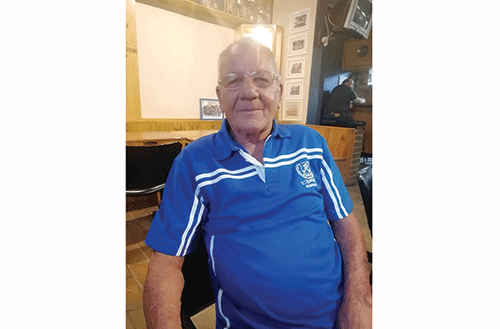He came, saw and vigorously conquered the hard and dry pitches of Namibian football. Now retired, former Ramblers Football Club versatile midfielder Peter Gurney has certainly left deep tracks in the annals of Namibian football history during his flawless lodging at the exciting Pionierspark outfit.
Joining forces with Rammies from local bitter-rivals Sport Klub Windhoek (SKW) after a brief spell with the “Immer Wieder”, Gurney transformed Ramblers into a formidable unit, doubling as player/coach and will go down in history as a club legend.
The Liverpool-born midfielder was at the helm when the fired-up Rammies caused havoc in the domestic all-white national football league in 1975, winning all available silverware on offer under his guidance as player/coach.
New Era Sport caught up with the much-adored 80-year-old former Ramblers astute mentor as he walks us through his untold, amazing football journey, which started way back in his native England with the Liverpool Boys Club.
Born Peter Gurney in 1943 in the iconic maritime city Liverpool, hold up in north-west England, which is home to one of the greatest pop music bands of all time, The Beatles, young Gurney arrived in Cape Town, aged 15 when his parents relocated to South Africa in 1957.
Regrettably, the fairly young Liverpudlian could not play football, as he was sent to the rugby-playing St George’s Grammar Caledonian boarding school in Hartleyvale. His unbelievable lightning speed and amazing ball sense propelled him to be slotted into the fullback position for the school’s rugby 15s.
In the meantime, elder brother John Gurney was playing competitive football for the University of Cape Town team and persuaded his kid brother to switch codes. Aged 18, and barely out of his pair of shorts, Gurney did not need a second invitation and grabbed the opportunity with both hands.
In his debut season in topflight football, Gurney played a pivotal role when the UCT side clinched the South African Varsity Cup. His next stop was a two-year spell with the Cape Town City amateur side before he signed a professional contract with local giants Hellenic.
Admittedly, a niggling ankle injury curtailed his progress, forcing him to stop playing football for a considerable period. However, he decided to come to South West Africa (SWA) on a business trip in 1972 and fell in love with the laid-back lifestyle in the Land of the Brave.
Whilst in Windhoek, Gurney was talked out of his temporary retirement and persuaded by Hans Buchart to join local German outfit SKW. However, the Englishman vacated the “Immer Wieder” stable, only to resurface at arch-rivals Ramblers.
“In all honesty, I really had wonderful times and enjoyed every single moment of my stay with SKW during my one-season stint with them”. The easy-going calculated number eight was welcomed with open arms at Tunschell Strasse, immediately winning the hearts and admiration of his new teammates and club supporters to the extent that he was installed with the distinct honour of player/coach. Under his shrewd guidance, the rejuvenated Rammies side made a clean sweep in 1975, winning all available silverware there was to be won. A Jack of all trades, the likeable Englishman also represented his adopted land SWA at provincial level as a noted batsman in the cricket discipline. He scored an astonishing 100 runs against Western Province Country Districts in Nelspruit, South Africa.
Gurney captained the South West Africa football team in the highly-competitive South African Inter-Provincial Currie Cup tournament in 1972. He was also in the starting lineup for the all-white invitational 11 during the historic mixed-race exhibition match against their black counterparts at the packed-to-the-rafters Suidwes Rugby stadium in 1975.
The historic tie ended in a controversial 3-all stalemate after the all-whites were awarded a highly-dubious thrice-taken penalty kick in the dying minutes of an otherwise entertaining spectacle. Admittedly, that particular encounter ultimately paved the way for the inevitable introduction of multi-racial football in apartheid South West Africa in 1977.
The now-retired father of 51- and 53-year-old sons is living life to the fullest. Nowadays a well-settled roaming resident, Gurney has embarked on an amazing trajectory imploring the beauty of nature at full throttle.
The retired footy sold his establishment in exchange for a caravan courier in the coastal town of Knysna, mounted on the banks of the giant Atlantic Ocean in the Western Cape Province, South Africa. He still has fond memories of his time in Namibia and could not shower enough praise on his other half – Sue.
“I’m a great deal indebted to my amazing wife Sue. She stood by me through the hardest tests of times,” concluded the humorous Gruney, wearing a naughty smile on his well-shaven face, as he gestures towards Sue, calmly mounted in close proximity during the hastily arranged interview.



